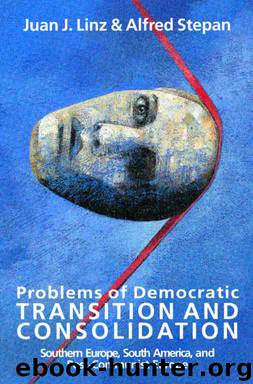Problems of Democratic Transition and Consolidation: Southern Europe, South America, and Post-Communist Europe by Alfred Stepan & Juan J. Linz

Author:Alfred Stepan & Juan J. Linz [Stepan, Alfred]
Language: eng
Format: mobi
Publisher: Johns Hopkins University Press
Published: 1996-08-08T04:00:00+00:00
BULGARIA: A REGIME-CONTROLLED TRANSITION FROM EARLY POST-TOTALITARIANISM
The secondary and monographic literature on the Bulgarian transition is still much less rich than it is for Hungary or Czechoslovakia, so our analysis is necessarily more tentative. However, this literature, supplemented by our visits and interviews, allows us to assert with some confidence that, unlike the transitions in Hungary or Czechoslovakia, the early post-totalitarian regime in Bulgaria initiated and never lost control of the transition and that the leaders of that regime emerged from the first free elections not only with a plurality of the vote but with a newly reconstituted claim to power. What accounts for such a different path out of post-totalitarianism in Bulgaria, in contrast to Hungary and Czechoslovakia? Much of the explanation seems to be found in the nature of the previous early post-totalitarian regime and the limited role the democratic opposition was able to play in that regime, given its intermittent and illegal nature.
Table 17.5. The “Terminating” Election of Czechoslovakia in 1992: Party Vote and Seats for the Federal Chamber of People and Chamber of Nations, Compared with Votes Needed in Chamber of Nations to Veto any Significant Federal-related Legislation Passed by the Chamber of People
Download
This site does not store any files on its server. We only index and link to content provided by other sites. Please contact the content providers to delete copyright contents if any and email us, we'll remove relevant links or contents immediately.
| Anthropology | Archaeology |
| Philosophy | Politics & Government |
| Social Sciences | Sociology |
| Women's Studies |
The Secret History by Donna Tartt(19053)
The Social Justice Warrior Handbook by Lisa De Pasquale(12187)
Thirteen Reasons Why by Jay Asher(8893)
This Is How You Lose Her by Junot Diaz(6877)
Weapons of Math Destruction by Cathy O'Neil(6265)
Zero to One by Peter Thiel(5786)
Beartown by Fredrik Backman(5737)
The Myth of the Strong Leader by Archie Brown(5500)
The Fire Next Time by James Baldwin(5431)
How Democracies Die by Steven Levitsky & Daniel Ziblatt(5215)
Promise Me, Dad by Joe Biden(5141)
Stone's Rules by Roger Stone(5081)
A Higher Loyalty: Truth, Lies, and Leadership by James Comey(4954)
100 Deadly Skills by Clint Emerson(4921)
Rise and Kill First by Ronen Bergman(4779)
Secrecy World by Jake Bernstein(4741)
The David Icke Guide to the Global Conspiracy (and how to end it) by David Icke(4709)
The Farm by Tom Rob Smith(4502)
The Doomsday Machine by Daniel Ellsberg(4484)
